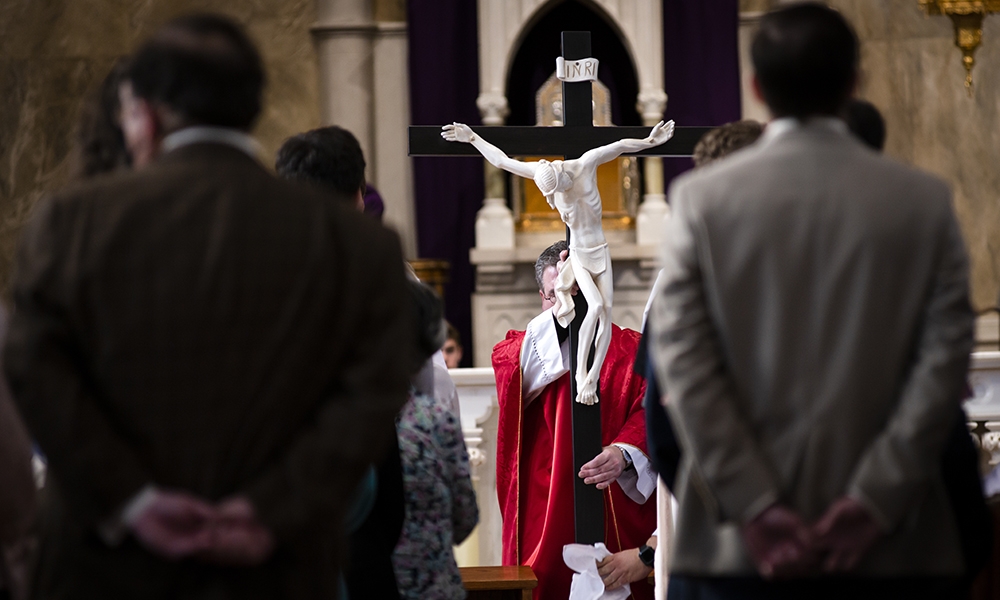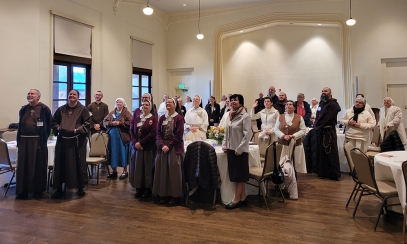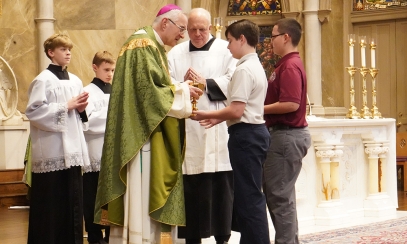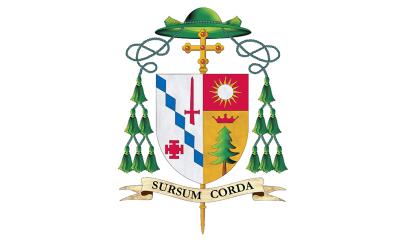
Barabbas and the true Son of the Father
On April 18, Bishop Raica marked Good Friday at the Cathedral of St. Paul. The complete text of his homily follows herein.
On April 18, Bishop Raica marked Good Friday at the Cathedral of St. Paul. The complete text of his homily follows herein.
My brothers and sisters, on this Good Friday, we stand at the foot of the Cross. We hear again the story that breaks our hearts and heals them at the same time—the Passion of our Lord Jesus Christ according to St. John.
There are so many elements of this story that can inform our spiritual lives that would take a lifetime to unpack them all. Yet, buried deep within that familiar story is a moment that passes quickly, almost like a shadow. Pilate stands before the crowd, a man caught between fear and truth, and offers them a choice: “Do you want me to release to you the King of the Jews?”
But they shout back, “Not this one but Barabbas!” And John the Evangelist offers us with the context: “Now Barabbas was a revolutionary.” Some use the term, bandit, a provoker of violence, a sort of antiestablishment person ready to disrupt good public order.
There’s more to the story; a deeper insight hidden in that name than we might realize. Barabbas (Bar-Abba) in a simple dissection of the name is made up of “bar” (son of) and “abba” (father). The name quite literally means “son of the father.”
So, in that moment, the crowd has to choose between two “sons of the father.”
One is Jesus, Who professes that [He] knows the Father and the Father knows [Him]. “The Father and I are one … I go to the Father.” Jesus is the true Son, the obedient Son, the One Who comes to do the will of the Father out of perfect love and affection and union with the Father.
The other, Barabbas – “son of the father”— is the counterfeit, a man of violence, confusion, and unrest who brings no honor to the father except to besmirch the name and do anything he wants without regard for the other.
And here is the painful irony: Because of the crowd, Barabbas walks free; Jesus is condemned. Barabbas lives; and Jesus dies on the Cross. Barabbas’ life is spared; Jesus, the Son of God, is not.
But don’t we all see a bit of ourselves in the figure of Barabbas? He is the one who is released—not because he is innocent, but because Jesus will take his place.
And yet, what does Barabbas do with that freedom? As a revolutionary, he shirked any and all responsibility.
A fascinating novel Barabbas by Pär Lagerkvist in the 1950s provides some interesting insights here: “He had been given life, but he did not know what to do with it.” The tragedy of Barabbas is not just that he was chosen by the mob over Christ, but that he walks away from the cross without knowing what it truly means. He’s unchained, but not truly free. He is “free” in his own mind but directionless. He survives but is not saved. Because even though he’s escaped death, he has no idea what it means to live. His heart is restless. He wants to believe in the man who died in his place. “Perhaps he really wanted to. But he was unable to.”
You see, brothers and sisters, freedom without truth is not freedom at all. Freedom without right relationship is not freedom at all. Being spared is not the same as being saved. Barabbas leaves the cross behind but not his chains which haunt his heart and soul.
But Jesus—oh, Jesus—walks toward the Cross with full knowledge of Who He is. He is the true Son of the Father. He doesn’t fight. He doesn’t plead. He doesn’t run. In contrast, Jesus, silent before Pilate, crowned with thorns, scourged and mocked, embraces His mission with clarity. He knows Who He is: “I am in the Father and the Father is in Me.” (John 14:11) He doesn’t fight for release because He knows that true freedom is found not in escape, but in love, in sacrifice, in truth. He “becomes” the Lamb Who takes away the sin of the world.
Barabbas, on the other hand, represents a counterfeit freedom: freedom without identity, freedom without mission, freedom without truth.
Because Jesus knows that true freedom is found “not in running away from suffering” but in pouring out love. Here is the hope we cling to today, even on this darkest of days of our liturgical calendar. When the crowd chose Barabbas, Jesus didn’t fight it. He accepted it. He didn’t object to it. He took His place. Indeed, He took our place. And in doing so, He opened a way for all of us not just to be released from sin but to be “reborn as sons and daughters of the Father.”
That’s the difference.
Barabbas was called “son of the father” by name, but Jesus shows us how to become sons and daughters “by grace.” We who have been baptized in Christ become sons and daughters of God. We too, as Christians, become sons and daughters of the Father.
So, as we gaze upon the Cross, this moment of deep and profound love for us, we remember this: Yes, we are at times like Barabbas – forgetful, rebellious, wanting to do our own thing without reference to the One to Whom we belong. Through Jesus, however, we are more. We are forgiven. We are redeemed. We are loved with a love stronger than death. We experience a freedom that this world cannot comprehend. Because our freedom, moves us toward God, and moves us toward becoming truly ourselves as part of God’s dream for us.
And when we follow Christ, even to the Cross, we do not walk into darkness. We are swept up and lifted up with Christ to walk into the light of Easter morning, for on that day, there will be freedom from the final and ultimate chain that weighs us down which even Barabbas couldn’t escape: and that is death itself.
We adore You O Christ and we praise You, because by Your holy Cross You have redeemed the world. Amen.



